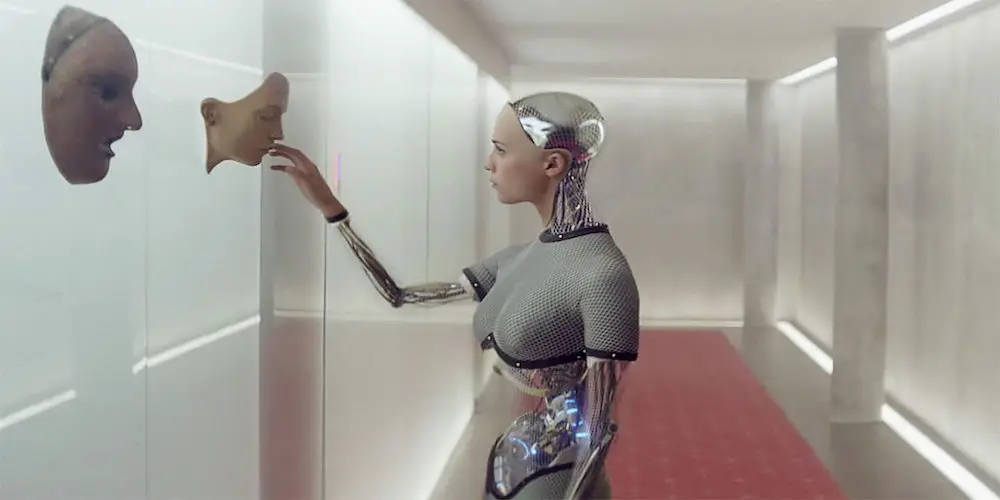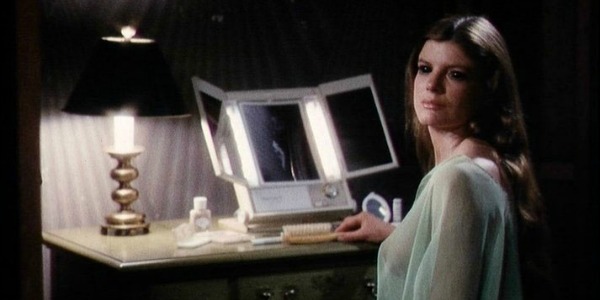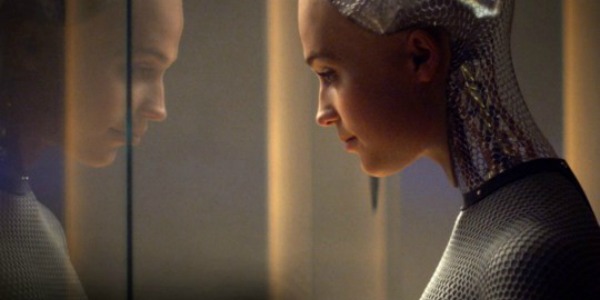Autonomy Of Androids: The Male Gaze In Science Fiction

Amanda Mazzillo is a writer with an MFA in Dramatic…
Attitudes about the male gaze have been present in science fiction cinema for years, especially relating to the identity of female robots. This includes the objectification of these characters and the loss of their autonomy, which reflects real life attitudes towards women. Many films have been made to show the dangers of viewing women as objects, yet we still see the male gaze in motion pictures every day. We see women being treated solely as a fantasy for male characters, in and out of the genre on which this article focuses.
The idea for this article came about while reading about the Uncanny Valley, which refers to the idea that we grow more uneasy when objects become closer to resembling humans, but something is missing. This creates an area of unease between objects which are almost human and actual humans, like ourselves. The Uncanny Valley made me realize my fear of humanoid objects subsided when it came to female robots. Instead of feeling unease at their almost human-like characteristics, I felt pity.
I could see these characters as women, struggling with their identity in the world. I instantly saw these robots as women being objectified by the human men in their lives, just how women fear for their own autonomy every day.
The Uncanny Valley in Science Fiction
One of my childhood fears came from dolls with flickering eyelids over the top of glassy eyes. When I thought about the Uncanny Valley, I thought my fear should translate to humanoid robots because they are that much closer to being lifelike, but instead my fear all but fell away, and was replaced with concern and anger at the men who put these women in this position.
This trope has been explored in many films over time, some of which view the autonomy of robots as something to be afraid of. Others see the true horror reflected in the male creators of these prominently female robots.
The Satire of The Stepford Wives
An example of the juxtaposition between reality and imitation in film is Bryan Forbes’ adaptation of Ira Levin’s novel, The Stepford Wives. This portrays women being created as objects whose sole purpose is to serve men (a prominent theme throughout many forms of science fiction). In The Stepford Wives, women lose their autonomy, as a way for them to be the perfect women.
This film uses the trope as a way to satirize the men who think a perfect woman is a woman who is completely controlled by a man. This loss of autonomy is a primary feature in society. In certain films, this is seen as a horrific society, but these viewpoints are present in daily life. The real horror is seeing men think this is the correct way to treat a woman, to cut her off from her friends; to make her serve the man while ignoring her own needs.
The story of The Stepford Wives follows Joanna (Katharine Ross) as she enters the Stepford community, which her husband Walter (Peter Masterson) so eagerly wants to join. Joanna does not understand why all the women in the town serve their husbands while ignoring their needs. Slowly, throughout the film, different women in the town change into a male fantasy of the perfect woman.

We see it happen to Joanna’s best friend, Bobbie (Paula Prentiss). She supported Joanna, but once she went on a weekend trip with her husband, she lost all semblance of a personality. She was replaced by someone who cared only about her husband, and did not leave any room in her life for her own needs.
Throughout the film, we learn this has happened to every woman in the town. At one point, the president of a women’s association suddenly decided this was not a good use of her time and began to morph into something more societally obedient. Another woman says doing something for herself is a waste of her time she could spend baking and cleaning.
All the women in the film lose their autonomy because their husbands cared more about a fantasy than the woman they chose to marry. All the men in the town agreed to kill their wives as a way to manufacture a life where their wives had no autonomy in any aspect of their lives.
The ending of the film shows Joanna being killed by the robot version of herself. This shows the audience that her husband agreed to kill his wife, in order to have a robotic version of her, with bigger breasts, who would bend to his every whim.
Seeing all the women in this film lose what defined them as people is the most horrific aspect of the entire film. We see women change from individuals with their own identities and interests into copies of what men deem the perfect woman.
The Struggle of Women in Ex Machina
Ex Machina addressed this when the characters on screen discussed choosing to make the robots resemble women, going as far to give them pleasure centers. Both of these films look at the treatment of women in society, by showcasing this treatment through a futuristic worldview.
We, as an audience, are supposed to identify with the struggles of the women against their creators and oppressors. Sometimes this can get muddled for some audiences who have an ingrained reaction towards humanity versus artificial technology, but these films show how terribly inhumane humanity can truly be.
I’ve seen many people justify Caleb (Domhnall Gleeson) as a nice guy and painting only Nathan (Oscar Isaac) as the oppressor, but we must understand that Caleb was happy to go along with an experiment where the artificial intelligence was made to fit his attractions and desires. He did not think anything of this until it threatened his own safety.

Caleb did not show much concern when he learned Ava (Alicia Vikander) was made with personality and physical traits of his perfect woman, or when he learned Ava was made with in tact pleasure centers. He only began to show concern when this knowledge could hinder his chances with her. He only showed true concern when he felt his life was at stake.
All the robots in this film are designed as women, and in an eerie scene, we see Nathan has taken advantage of all of them. We see a room filled with naked female robots. This one scene shows how Nathan views these artificially intelligent women as objects to consume and throw away. He takes his stance as creator too far and feels he can use them any way he chooses.
None of the women in this film have autonomy, but we know they are intelligent enough to express their own thoughts and feelings. These robots know what is being done to them, yet they do not have the chance to do anything about them. This is why it is such a triumph when we see Ava and Kyoko (Sonoya Mizuno) rise against their oppressor by working together.
Ex Machina shows female characters rising up against their male creator/oppressor. This ending shows how much pain women go through when they are unfairly treated. Seeing Ava escape from men who want to treat her as a sexual entity or an experiment is what makes this film such a good use of a trope, which could be used to further the mistreatment of women. Instead, this film shows a woman overcoming this oppression and being the hero of the story.
The Definition of Human in Blade Runner
When they say “more human than human” in Blade Runner, I take it to mean that the replicants are more humane than the characters we are supposed to see as protagonists. The replicants act as a family – wanting to save one another while the protagonist of the film is hired to kill them. This is because humans see anyone different than themselves as a villain.
We project our worst characteristics onto others and see them as villains, who need to be destroyed. Rachel (Sean Young) is raped by Deckard (Harrison Ford) as a way to show her the truth, but whose truth is that? The truth of a human who sees himself as a hero and spits in the face of anyone different.
In this scene, Deckard is shown forcing Rachel to tell him to kiss her. In a way, he is trying to reprogram her, so she is more suited to his needs. I’ve seen this accepted multiple times as normal, mostly because she is a replicant, and is made to serve.

That idea does not change the fact that what we see is rape. It may even make it more obvious to me, since the very idea of the scene condones the idea that robots/replicants are created to serve the needs of men.
If Rachel was not a replicant, would we not flinch seeing her accept her fate after trying to escape only seconds before? This scene plays like any other rape scene, but because Rachel is not human, audiences can automatically justify it. Audiences, as well as the human men in the film, see Rachel as an object rather than a person with feelings.
This leads into the theory Deckard himself is a replicant. My main disagreement with this is his level of human selfishness. Like Caleb in Ex Machina, Deckard worries about himself and only shows feelings for Rachel when it would benefit him in some way.
Conclusion
By examining these different films, I believe the male gaze plays a part in the depiction of women as robots, created for male enjoyment. I also believe this trope can be explored in a way which showcases the dangers this treatment of women can do to a society, instead of using it to glorify this male dominated culture of cutting away autonomy from women until they have nothing left for themselves.
When films utilize the male gaze, they show male fantasies of women instead of female characters with their own stories and identities. Seeing women constantly being treated as objects results in people growing up thinking it is normal and accepted. If films continue to show this viewpoint as something dreadful, hopefully it will help to move us forward into a society where women are treated as people rather than objects to be consumed.
What are your thoughts about this trope and its influence on society? Please share in the comments.
Does content like this matter to you?
Become a Member and support film journalism. Unlock access to all of Film Inquiry`s great articles. Join a community of like-minded readers who are passionate about cinema - get access to our private members Network, give back to independent filmmakers, and more.
Amanda Mazzillo is a writer with an MFA in Dramatic Writing from SCAD and a BA in Writing & Linguistics and Film Studies minor from Georgia Southern University. She enjoys writing comedy and exploring all forms of media. Her Twitter name is a bad pun: @mazzillofirefox












